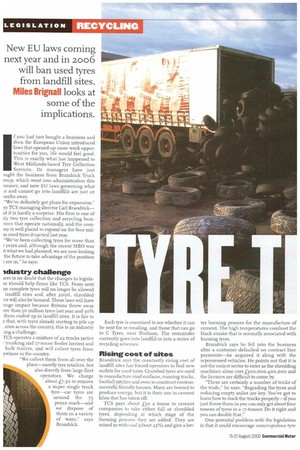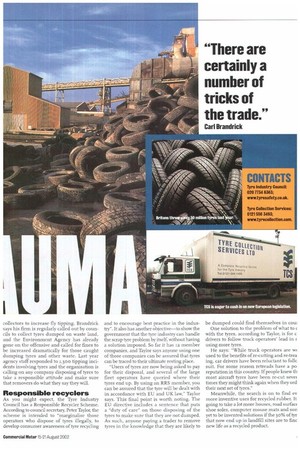New EU laws coming next year and in 2006 will
Page 42

Page 43

If you've noticed an error in this article please click here to report it so we can fix it.
ban used tyres from landfill sites. Miles Brignall looks at some of the implications.
If you had just bought a business and then the European Union introduced laws that opened up more work opportunities for you, life would feel good. This is exactly what has happened to West Midlands-based Tyre Collection Services. Its managers have just night the business from Brandrick Truck roup, which went into administration this inamer, and new EU laws governing what n and cannot go into landfills are just io onths away.
"We've definitely got plans for expansion," ys TCS managing director Carl Brandrickid it is hardly a surprise. His firm is one of ily two tyre collection and recycling busisses that operate nationally, and the corniny is well placed to expand on the four milin used tyres it carried last year.
"We've been collecting tyres for more than ) years and, although the recent MB° was it what we had planned, we are now looking the future to take advantage of the position Is are in," he says.
iere is no doubt that the changes in legislain should help firms like TCS. From next ne complete tyres will no longer be allowed landfill sites and, after 2006, shredded :es will also be banned. These laws will have huge impact because Britons threw away ore than 50 million tyres last year and 30% them ended up in landfill sites. It is fair to y that, with tyres already starting to pile up . sites across the country, this is an industry :ing a challenge.
TCS operates a mixture of 22 trucks (artics trunking and 17-tonne feeder lorries) and bulk trailers, and will collect tyres from ywhere in the country.
"We collect them from all over the place—mostly tyre retailers, but also directly from large fleet operators. We charge about £7.50 to remove a super single truck tyre—car tyres are around the 75 pence mark—and we dispose of them in a variety of ways," says Brandrick. Each tyre is examined to see whether it can be sent for re-treading, and those that can go to C Tyres, near Durham. The remainder currently goes into landfill or into a series of recycling schemes.
Rising cost of sites
Brandrick says the constantly rising cost of landfill sites has forced operators to find new outlets for used tyres. Crumbed tyres are used to manufacture road surfaces, running tracks, football pitches and even to construct environmentally friendly houses. Many are burned to produce energy, but it is their use in cement kilns that has taken off.
TCS pays about bo a tonne to cement companies to take either full or shredded tyres, depending at which stage of the burning process they are added. They are mixed in with coal (about 25%) and give a bet ter burning process for the manufacture of cement. The high temperatures combust the black smoke that is normally associated with burning tyres.
Brandrick says he fell into the business after a customer defaulted on contract hire payments—he acquired it along with the repossessed vehicles. He points out that it is not the easiest sector to enter as the shredding machines alone cost L300,000-400,000 and the licences are difficult to come by.
"There are certainly a number of tricks of the trade," he says. "Regrading the tyres and reducing empty miles are key. You've got to learn how to stack the trucks properly—if you just throw them in you can only get about four tonnes of tyres in a 17-tonner. Do it right and you can double that."
One potential problem with the legislation is that it could encourage unscrupulous tyre collectors to increase fly tipping. Brandrick says his firm is regularly called out by councils to collect tyres dumped on waste land, and the Environment Agency has already gone on the offensive and called for fines to be increased dramatically for those caught dumping tyres and other waste. Last year agency staff responded to 1,300 tipping incidents involving tyres and the organisation is calling on any company disposing of tyres to take a responsible attitude and make sure that removers do what they say they will.
Responsible recyclers
As you might expect, the Tyre Industry Council has a Responsible Recycler Scheme. According to council secretary, Peter Taylor, the scheme is intended to "marginalise those operators who dispose of tyres illegally, to develop consumer awareness of tyre recycling and to encourage best practice in the industry". It also has another objective—to show the government that the tyre industry can handle the scrap tyre problem by itself, without having a solution imposed. So far it has 12 member companies, and Taylor says anyone using one of those companies can be assured that tyres can be traced to their ultimate resting place.
"Users of tyres are now being asked to pay for their disposal, and several of the large fleet operators have queried where their tyres end up. By using an RRS member, you can be assured that the tyre will be dealt with in accordance with EU and UK law," Taylor says. This final point is worth noting. The EU directive includes a sentence that puts a "duty of care" on those disposing of the tyres to make sure that they are not dumped. As such, anyone paying a trader to remove tyres in the knowledge that they are likely to be dumped could find themselves in coui One solution to the problem of what to c with the tyres, according to Taylor, is for c drivers to follow truck operators' lead in r using more tyres.
He says: "While truck operators are w< used to the benefits of re-cutting and re-trea ing, car drivers have been reluctant to folic suit. For some reason retreads have a po reputation in this country. If people knew th most aircraft tyres have been re-cut sevet times they might think again when they ord their next set of tyres."
Meanwhile, the search is on to find ev more inventive uses for recycled rubber. It going to take a lot more houses, road surfact shoe soles, computer mouse mats and son yet to be invented solutions if the 30% of tyr that now end up in landfill sites are to finc new life as a recycled product.
















































































































































